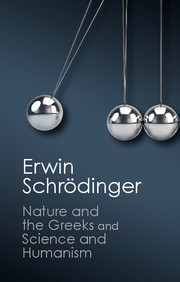Book contents
Foreword
Published online by Cambridge University Press: 05 October 2014
Summary
I vividly recall reading Erwin Schrödinger's slim volume Science and Humanism some forty years ago, probably at a time while I was still a research student in Cambridge. It had a powerful influence on my subsequent thinking. Nature and the Greeks, although based on slightly earlier lectures, was not published until somewhat later, and I have to confess that I did not come across it then. Having only now read it for the first time, I find a remarkable work, of a similar force and elegance.
The two volumes go well together. Their themes relate closely to each other, being concerned with the nature of reality and with the ways in which reality has been humanly perceived since antiquity. Both books are beautifully written, and they have a particular value in enabling us to share in some of the insights of one of the most profound thinkers of this century. Not only was Schrödinger a great physicist, having given us the equation that bears his name – an equation which, according to the principles of quantum mechanics, governs the behaviour of the very basic constituents of all matter – but he thought deeply on questions of philosophy, human history and on many other issues of social importance.
- Type
- Chapter
- Information
- 'Nature and the Greeks' and 'Science and Humanism' , pp. vii - xPublisher: Cambridge University PressPrint publication year: 2014

